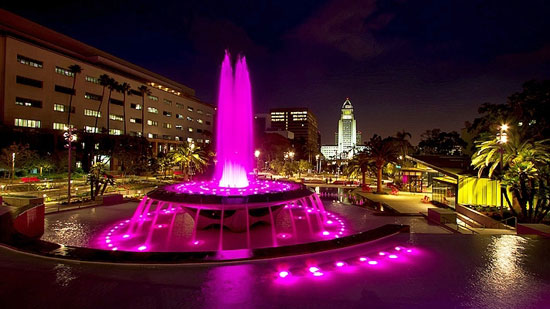For Hollywood, no splendor in the park
April 5, 2013

The scene at Grand Park, where film executives have complained about high fees. Photo/Shabdro via Flickr
Lucas Rivera had barely gotten his feet wet in Grand Park’s beautifully restored fountain when Hollywood came calling. Sony’s Screen Gems told the park’s newly named director that it wanted to use the Arthur J. Will Memorial Fountain in a scene for an upcoming remake of the romantic comedy “About Last Night.”
But what studio executives say they heard from Rivera last fall was no laughing matter. The price to film in L.A’s hippest new green space was $20,000 for each of the park’s four blocks—the steepest fee for any publicly-owned venue in Los Angeles.
Lucas, who was swamped with planning the park’s gala grand opening at the time, says the request “came at us out of nowhere.” The filmmakers repeatedly insisted on lower rates but Lucas says there was nothing he could do because the fees had been formally set by the county. Already committed to the location, the studio grudgingly paid the $20,000. But that was only the first act of a civic drama that, for months, has pitted county officials against their hometown industry.
Since October, the cost of filming in Grand Park has become a cause célèbre among location scouts, labor leaders and studio representatives, who’ve publicly challenged the county’s commitment to keeping entertainment jobs in the Los Angeles region. Screen Gems is the only studio so far to pay Grand Park’s high price of admission. In interviews and in testimony before the Board of Supervisors, industry officials have argued that the high film fees at Grand Park and such famous county-owned venues as the Hollywood Bowl, Walt Disney Concert Hall and the Los Angeles County Museum of Art are contributing to the long-running exodus of Hollywood jobs to more film-friendly locales in the U.S. and abroad.
“These are iconic Los Angeles County landmarks and we are turned away from filming them due to high fees or rules that seem designed to discourage production companies to even consider approaching them rather than embracing this cornerstone industry that helped create part of the rich history that is Los Angeles,” Teamsters official Ed Duffy, who represents location managers, complained to a receptive Board of Supervisors last October. The board ordered a review of the controversial rates by the Chief Executive Office.
On Tuesday, the board is expected to vote on a new permit structure for Grand Park proposed by the county CEO in the wake of the industry’s complaints. The proposed rates have been slashed by 74%, but the fees are still prohibitively high for a public park, industry representatives insist. The county says its goal is to strike a balance between the economic needs of the entertainment business and the park’s primary purpose as a place “first and foremost for the community to enjoy.”
Rivera understands Screen Gem’s case of sticker shock and acknowledges that the initial rates didn’t achieve the right balance, which he mostly attributes to the park’s growing pains.
“We’re young, we’re going to make some bad choices,” Rivera says. “But this is a learning process. With all the people involved, we’re going to get it right…My main concern has been to program the park and make it a destination place for Angelenos.”
So far, he seems to be succeeding.
The park, with its unique cityscape surroundings and dramatic view of City Hall, has been widely praised for its programs, from noontime yoga sessions to a weekly farmer’s market to a presidential election-night viewing party broadcast live by CNN. The CEO says the park, which is managed by the Music Center, attracted more than 19,000 visitors during its first six months of operation and has established 53 programming partnerships.
Entertainment industry representatives say they fully respect that the county’s No. 1 priority is to make the park a hit with the public.
Philip Sokoloski of Film LA, a nonprofit organization that coordinates and processes film permits, says industry executives “realize the park is for public enjoyment first…They don’t want to displace other activities and uses. They just want to make sure they aren’t priced out of the park.”
Some fee critics, though, even question the county’s rationale, noting that even under the new pricing structure, it would cost $12,000 to rent all four blocks of Grand Park between the overnight hours of 9 p.m. and 9 a.m.
County officials say they based the original and revised rates on those charged by other high-end venues here and across the country, including the Huntington Library in San Marino, a private nonprofit institution that charges $11,000 a day, and the Hollywood Bowl, which costs $17,000 to rent. But industry representatives argue that Grand Park’s pricing should be in line with more comparable county venues, including Descanso Gardens and the Los Angeles County Arboretum and Botanic Garden, which charge daily rates of between $1,500 and $6,400 and are often used for film shoots.
Dawn McDivitt, who oversaw Grand Park’s construction for the CEO’s office and continues to play a key role in its operation, says she hopes the new rates will be approved by the board on Tuesday. She knows that some entertainment industry officials still will be unhappy, but she says the county will evaluate the program in six months. Nobody in the county, she says, is ready to say the issue is a wrap.
“We’ll look at the experience we’ve gained from having filming in the park and its impact on the public we want to serve,” McDivitt says. “It’s all an evolving process.”
Posted 3/21/13












 405 bridge work causes a stink
405 bridge work causes a stink
